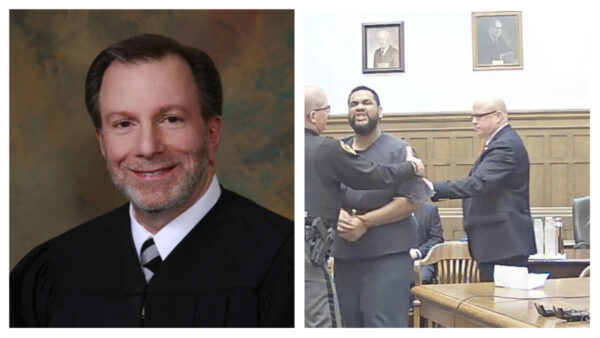‘Clouded Judgment Often Results In Unjust Outcomes’: Ohio Supreme Court Rules Judge Can’t Add Six Years to a Prison Sentence Because the Man Called Him Names
The Ohio Supreme Court has reversed a lower court’s decision to tack on a few years to a man’s sentencing as a penalty for calling the trial judge names. The justices contended that while the outburst was rude, it did not warrant his punishment being extended.
In March 2019, after a jury found Manson Bryant, a Black man, guilty of aggravated burglary, aggravated robbery, kidnapping, and abduction in the July 2018 group home invasion of a man in Painesville Township, a Lake County Common Pleas Court judge, Eugene Lucci, sentenced Bryant to 22 years in prison.
Judge Eugene Lucci (left), Manson Bryant being restrained – Credit: Lake County Ohio Gov./Courtroom Video screengrab
Despite giving Bryant’s co-defendant 12 years, Lucci gave Bryant an additional 10 years because of his prior convictions.
At 32, Bryant had been in and out of courtrooms since he was 9 years old.
Included in his lengthy criminal history are three prison stints that he served for four different cases. And at the time of his arrest for this most recent crime, he was on parole, according to Reason.com.
Over the past decade, including the robbery, eight of the man’s criminal cases have been seen in Lucci’s courtroom.
Before the sentencing, Bryant was given the opportunity to speak from his heart to the bench. He said, “I’ve made a lifetime of bad decisions. I respect you and I respect your decision.”
After the sentencing, one that would ensure the man would spend the next two decades behind bars, Bryant lifted his voice again. This time, it was not as complimentary.
He shouted, with courtroom cameras rolling, “Twenty-two years? Man, f-ck your courtroom, you racist-ass b-tch.”
“F-ck your courtroom, man. You racist as f-ck,” he continued. “Twenty-two f-cking years? Racist ass b-tch. You ain’t sh-t.”
In response to the outburst, Lucci said, “Actually, actually … You know what? Remember when I said that you had some remorse? When I said that you had a certain amount of remorse, I was mistaken.”
Defiantly, Bryant snapped back, “F-ck your courtroom and suck my d-ck.”
The judge then sentenced him to an additional six years in jail for the verbal offense in his courtroom. Lucci said, “The court determines that maximum imprisonment is needed,” Lucci continued. “So that’s 28 years.”
Bryant continued to curse and disrespect the court until deputies from the Lake County Sheriff’s Office had to forcibly remove him from the courtroom.
Lucci then said, “The defendant has shown me that he has no remorse whatsoever, and therefore the court determines that maximum imprisonment is needed.”
“He poses the greatest likelihood of recidivism. I apparently thought that he was more remorseful than what he was. He was just feeding me a line of bull.”
When reflecting on one of the last times Bryant was in his court in 2014 and was sentenced to 12 months, the judge said his conduct was similar.
“The last time, as he was walking out of the court, he said, ‘Suck my d-ck, judge.’ It seems to be a repeat pattern with him,” recalled Lucci as he rendered the three-decade sentence.
Lucci did not have the last word on this case.
Bryant filed an appeal with the Ohio 11th District Court of Appeals, and while that court unanimously upheld the sentence, on Tuesday, June 7, the state’s Supreme Court decided to reinstate the original 22-year sentence.
In a 4-3 decision, the justices ruled that while Bryant’s words were vile, they were not related to the crime at hand and therefore could not be used to determine the sentencing for those crimes.
Justice Melody Stewart, writing for the majority, remarked, “If a defendant’s outburst or other courtroom misbehavior causes a significant disruption that obstructs the administration of justice, that behavior may be punishable as contempt of court.”
Stewart noted that while contempt of court might have added 30 more days to Bryant’s prison time, attaching six years would be inappropriate.
The court further noted his outburst had little to do with any feeling of remorse about the crimes he committed. They also said to suggest he wasn’t remorseful because of his outburst was not based on anything legal but on how the trial judge was feeling.
“There is no provision in the sentencing statutes that authorizes a trial court to impose or increase a defendant’s prison sentence merely because the defendant had an outburst or expressed himself in a profane and offensive way,” she wrote.
“And while a defendant’s showing of remorse is a sentencing factor to be considered by the trial court when applicable, it is hard to conceive of any honest and logical assessment of Bryant’s outburst that could be construed as being motivated by, or evincing, no remorse for his crimes.”
Stewart continued: “It would be ironic for the trial court to view Bryant’s outburst as an indication that he is likely to commit future crimes, which in turn warranted a six-year increase in the sentence in order to protect the public when the plain purpose behind Bryant’s statements was to communicate his disbelief that he received a 22-year sentence, thereby not affording him a meaningful opportunity to reenter society as a law-abiding citizen after rehabilitation.”
“Trial-court judges do get offended and angry, that anger clouds judgment and that clouded judgment often results in unjust outcomes,” the Justice added. “The record, in this case, demonstrates that fundamentally, this is what happened.”
Lucci has not commented on the decision because the window of time for him to request a reconsideration is still open.

